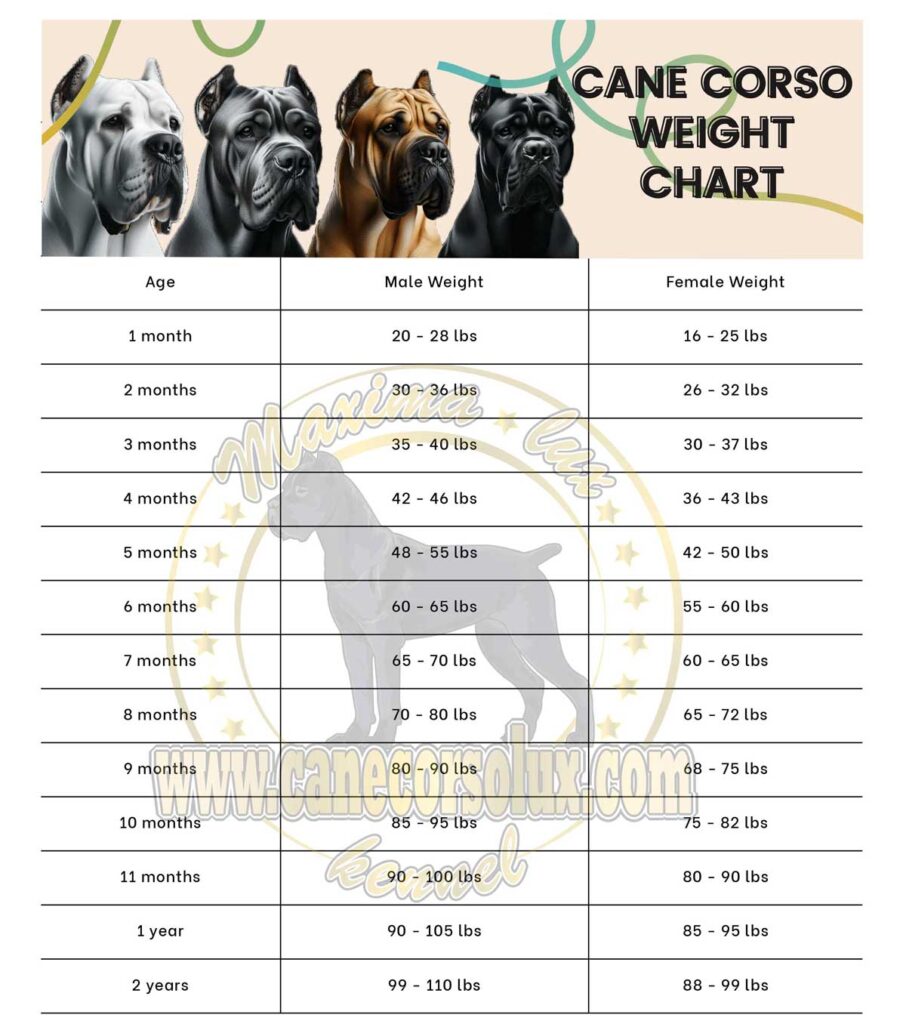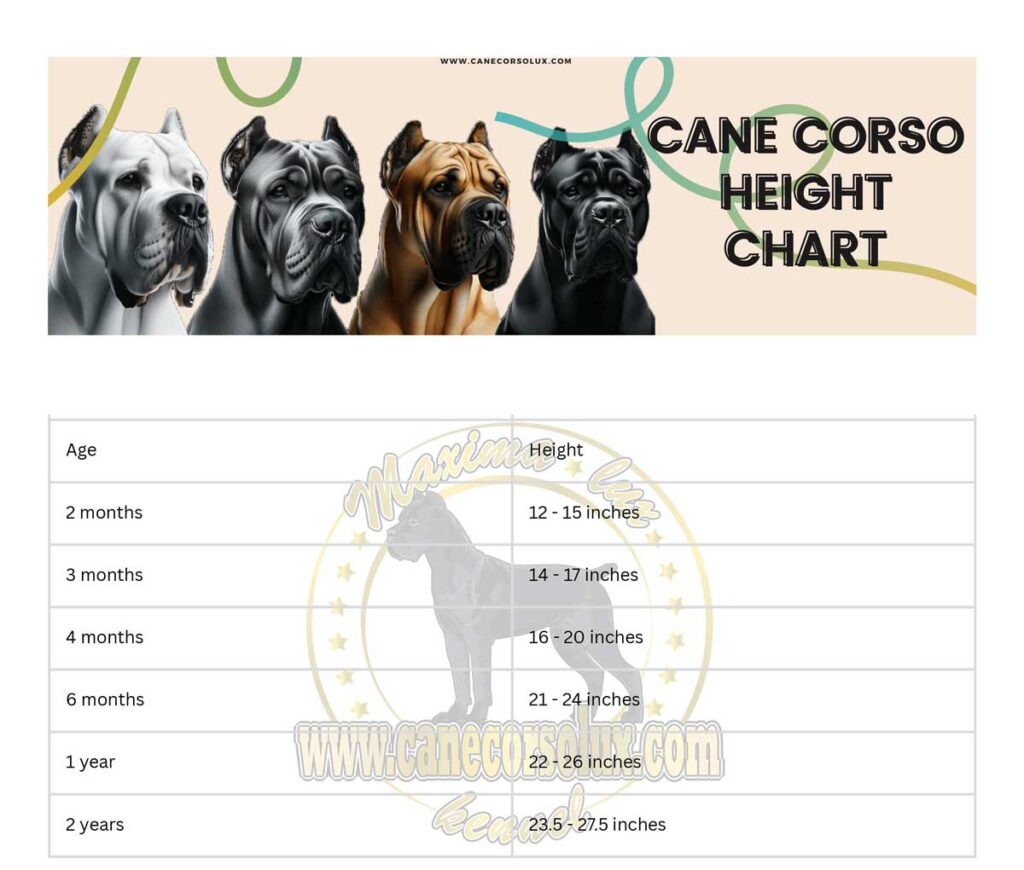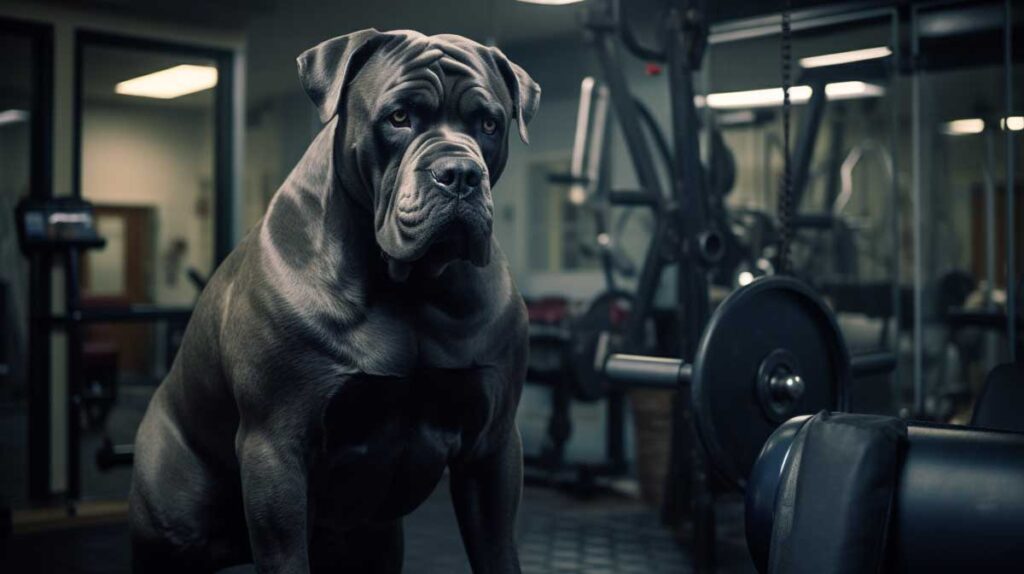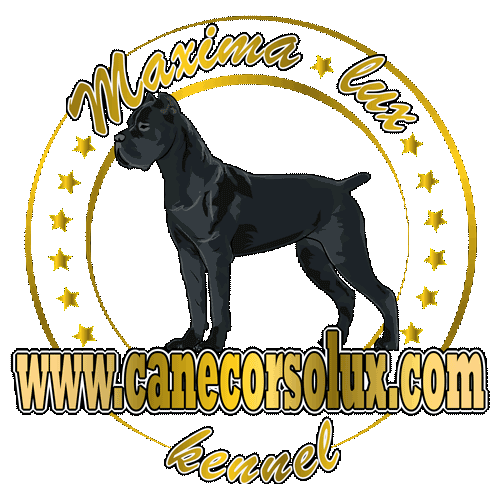How much should my Cane Corso puppy weigh at three months? How much does Cane Corso’s pup weigh at six months? How about adult Cane Corso? Is it even important how much my cane corso weighs?
How much should my Cane Corso puppy weigh at three months? How much does Cane Corso’s pup weigh at six months? How about adult Cane Corso? Is it even necessary to know how much my cane corso weighs? These are the questions that many people ask me. Therefore, I will explain how you can calculate your Cane Corso puppy weight.
Cane Corso Size Chart
Cane Corso Size Chart

Cane Corso Height Chart

I want a giant Cane Corso
As we discussed, Cane Corso must move quickly as a guarding dog. Many people want a giant cane corso as a guardian of their yard. The first question in our conversation is how much he weighs. The breed’s standard is for females weighing 40–45 kg (88–99 lb). For Italian mastiff males, 45–50 kg (99–110 lb) Giant Cane Corso only has speed and moving problems, hip, elbow, joint issues, and other weight-connected problems. The size doesn’t mean much if the Corso can’t move as it should. The dog’s health must be in the first place, not its unhealthy appearance.
As a long-time cane corso breeder, this is my perspective on the cane corso weight subject. I like to keep them lighter until one year old because their weight doesn’t affect their fast-growing skeleton and joints. So many customers want to own the biggest corso ever. So many breeders brag about their enormous cane corsos size and weight. But is this healthy for the dog? What problems can cause overweight? Well, stand by to hear my opinion.
Cane Corso puppies undergo several developmental stages that demand extra care and attention. They are born blind and deaf until two weeks old and spend most of their time eating and sleeping. Their eyes open at two weeks, and by three weeks, they can hear but still spend most of their time sleeping and feeding. They weighed between 1.1 and 6.6 lbs at the time (0.5 and 3 kg).
Around three weeks of age, when they weigh approximately 3.5 kg (7.7 lb), puppies can be introduced to solid food. They should be vaccinated at six weeks, weighing around 7 kg/15.5 lbs. Puppies with about 18 kg (40 lbs) start losing their baby teeth at four months and can go on short walks while continuing to be exposed to different people and places. Socialization is essential at this stage of their lives.
Cane Corsos begin to look more like dogs than puppies between the ages of seven and nine months and should have all of their adult teeth by month seven, weighing 40 kg (88 lbs). It is critical that they become accustomed to strangers during the socialization phase, and they can go on 30-minute walks.
I created a cane corso weight calculator to make maintaining a healthy weight more accessible for all cane corso owners.
Cane Corso Weight Calculator
Estimated weight:
How can you calculate your Cane Corso puppy weight?
Cane Corso puppies reach adult size at ten to twelve months, weighing between 88 and 99 pounds (40 and 45 kilograms), and require a fenced yard. They also need regular training and exercise. They reach full adult size by the end of month twelve, weighing 90–120 lbs (45–55 kg) and standing 25–27.5 inches (males) or 23.5–26 inches (females) at the withers.
Cane Corso is a powerful, large-breed dog. He was created for hunting and guarding. The Cane Corso is more athletic and agile than other mastiffs. Its deeply muscled frame easily recognizes the cane corso. I could say he is an athlete among mastiffs. That is why we must pay attention to his weight. By overweighting your puppy, you won’t show him more love. Being overweight is a severe problem for your cane corso.
The easiest thing you can do to calculate your Cane Corso puppy’s weight is to multiply their number of weeks by one kilogram or, in the United States, with 2,20 lb.
Example:
If your puppy is three months old, it is around 13 weeks. 13 multiplied by 1 kg, a puppy should be approximately 13 kilos, or in pounds, 13 multiplied by 2,20 lb equals 28,6 lb. Females should be half a kilo less, say 12,5 kg, and males half a kilo more, around 13,5 kg—same thing in pounds: females 1 lb less, 27,5 lb, and males a pound more, 29,5 lb.
That is the simplest and most accurate calculator you can use (by foot) for quickly checking your puppy’s weight.
Everything you need to know about your cane corso weight and a healthy life follows. Continue reading because these specifics could save your dog’s life!
Like many other large and muscular dog breeds, Cane Carso’s must carefully monitor their weight to ensure their continued good health. If you are a Cane Corso owner or breeder, you know how important it is to keep your dog at a healthy weight so they can live a long and happy life.
Cane Corsos should always be kept at a healthy weight because excess fat causes various health concerns, including arthritis, heart disease, and a shortened life expectancy. In addition, age, gender, and amount of activity can all affect a Cane Corso’s weight, making it challenging for your dog to maintain a healthy weight.
This discussion will delve into the best methods for controlling a Cane Corso’s weight, such as nutrition and exercise suggestions, and the significance of keeping tabs on a dog’s weight and making necessary adjustments. Cane corsos can have health problems related to their weight, and this discussion will also go into detail about such issues and how to prevent them.
Cane Corso owners and breeders may ensure their dogs enjoy long, healthy lives by learning about the importance of weight management and implementing appropriate measures.

The typical weight range for males and females
Male Cane Corso is a huge, athletic dog breed, with an average weight of 99 to 110 pounds (45 to 50 kilograms) and a height of 25 to 27 inches (64 to 68 centimeters) at the shoulder. Females average between 88 and 99 pounds (40 and 45 kilograms) and 23 and 25 inches (58 and 64 centimeters) in height. However, the genetics, environment, and health of an individual Cane Corso can cause their weight to vary from the averages below.
Age, gender, and physical activity all affect how much weight a dog gains or loses.
Cane Corso weight fluctuates with age, gender, degree of activity, and heredity. Cane Corso puppies often weigh significantly less than their full-grown counterparts. Males may also have a greater body mass than females. Cane Corsos, which leads to a more active lifestyle, may need a higher caloric intake to stay at a healthy weight. Finally, a Cane Corso’s normal weight range may be affected by heredity, with some families tending to produce larger or smaller dogs.
Benefits of Keeping a Healthy Weight
Cane Corsos need to watch their weight closely because being overweight can cause several health issues. For instance, hip dysplasia and arthritis can develop in dogs when their weight is too big. Other weight-related health issues, such as heart disease and diabetes, are also linked to obesity. In addition, overweight Cane Corsos have a lower quality of life since they have less energy and can’t participate in as many physical activities. Conversely, cane Corsos benefit significantly from being kept at a healthy weight, promoting a long, healthy, and active life.
Methods for Cane Corso Weight Control
Suggestions for a healthy diet, including dietary groups and portion control
Cane Corso weight management relies heavily on the dog’s diet. Giving your dog high-quality food that contains all the nutrients it needs without adding unnecessary fat is crucial. Avoid foods that use fillers or artificial preservatives, and seek out ones that list meat as the primary ingredient. It’s vital to adhere to the portion restriction recommendations a veterinarian makes or finds on food packaging. Overeating can occur when food is freely available or left out for long periods of time. Meals should be given regularly, and leftovers should be taken away after a specific time.
Exercise suggestions, such as frequency and duration of physical activity
Keeping a Cane Corso at a healthy weight also requires regular exercise. To be fit and trim, these canines need to get enough exercise daily. The needs and lifestyle of the dog will determine how often and for how long the dog should exercise. It is recommended, however, that Cane Corsos get at least an hour of exercise per day. Walking, running, playing, and training routines are all examples of such pursuits. To avoid damage, it’s best to work up to a higher intensity of exercise gradually. One of the best ways for your corso is swimming. This is the best way to train a muscle without putting pressure on joints. Swimming is recommended as the best way to train overweight dogs.
We made a video and explained one more method for calculating your puppy’s ideal weight:
Why it’s crucial to keep an eye on weight and make necessary adjustments?
The health of a Cane Corso depends on regular monitoring of its weight. Tracking the dog’s weight regularly can help owners make informed decisions about their pet’s diet and exercise needs. For instance, if a dog is gaining weight, it may be necessary to restrict its food consumption or encourage it to engage in more vigorous activity. However, let’s say a dog seems underweight or is dropping weight. Once more, they may need to alter their diet or increase their activity level. The optimum methods for controlling a Cane Corso’s weight should be determined in close consultation with the dog’s veterinarian.
You should also ensure your Cane Corso always has access to clean water, keep them away from human food and treats, and maybe even talk to a vet or animal nutritionist about making a special diet and activity plan for your dog. By following these measures, owners may ensure that their Cane Corso remains in the best possible physical health.
Cane Corsos and Their Weigh-Related Illnesses
Arthritis and hip dysplasia
Hip dysplasia is a common illness in cane corso world. Nobody can tell what causes it the most—heritage or living factors. This disorder is characterized by abnormal hip joint development, which can cause pain, inflammation, and, ultimately, arthritis. In something, after all these years in breeding, I am sure. Being overweight can only make it worse. Cane Corsos, as a breed, are unfortunately prone to this illness, and being overweight can worsen it. Hip dysplasia and arthritis are health problems that can arise from a Cane Corso carrying excess weight.
Diabetic and coronary illness
Cane Corsos, who are overweight or obese, are at a higher risk of developing cardiovascular disease and diabetes. High blood pressure and heart disease are two health problems resulting from carrying around excess weight. A decrease in insulin sensitivity may also result in diabetes. Adverse effects on quality of life and lifespan may result from these conditions.
Problems breathing and little energy
An overweight Cane Corso may also have trouble breathing and have less energy. This is because a dog’s lungs have to work harder to provide the body with oxygen when the dog is overweight. This might result in fatigue, difficulty breathing, and wheezing. Additional pounds also make it harder to engage in physical activity, leading to a less active and meaningful lifestyle due to a decline in overall energy levels.
Maintaining a healthy weight in Cane Corsos by combining nutrition and exercise is essential for preventing weight-related health problems. When managing their dog’s weight, owners should consult their veterinarian regularly. Cane Corsos benefits significantly from consistent preventative care, especially joint supplements and dental cleanings. By prioritizing weight control and general wellness, owners can increase the likelihood that their Cane Corso will live a long, happy life.
Suggestions for Efficient Weight Control
Choose a weight goal and track your progress.
Establishing a weight goal and checking your progress are the basis for effective weight management. The dog’s breed, age, and general health should all go into this goal weight. The owner and the veterinarian should settle on a healthy weight goal and establish a strategy for achieving it. Monitoring your weight and general health regularly can help you see your progress and make any necessary adjustments to your plan.
Modify your eating habits and portion size.
The impact of diet in controlling weight cannot be overstated. Quality dog food tailored to the dog’s breed, age, and activity level is necessary. Protein-dense foods with low carbohydrate and fat content are recommended. When trying to lose weight, portion control is essential. Free-feeding or keeping food out all day is not recommended. Owners should follow the feeding instructions on the product’s packaging or those a veterinarian gives.
Boost Your Exercise Routine
Increased physical activity is a crucial method for controlling weight. Being physically active on an ongoing basis is a great way to burn calories and keep your dog’s weight in check. Depending on the cane corso age and general condition, daily exercise needs can range from 30 minutes to 1 hour. Exercise can be anything from strolling to jogging, playing, training, and swimming. Include swimming whenever you can.
Engage their mind also
Maintaining a healthy weight can also be accomplished through mental stimulation. To prevent dogs from getting bored and eating as entertainment, providing them with toys, puzzles, and interactive activities is a good idea. The mental stimulation training sessions can also strengthen the bond between the dog and the owner.
Contemplate weight-loss diets and supplements.
Certain dogs may require special weight-management meals and supplements to reach and maintain a healthy weight. These diets are made with high-fiber, low-calorie ingredients to help dogs feel full on a lower calorie intake. Joint supplements, for example, can help overweight dogs’ joints stay healthy and mobile during activity.
Dog owners can aid their pets in achieving and maintaining healthy body weight and ward off health problems associated with excess weight by adopting the method described here. It is critical to collaborate with a veterinarian to develop a unique weight management strategy that considers the dog’s specific requirements and current health condition. Dogs can live long, healthy lives with the help of a balanced diet, regular exercise, and mental challenges.
When Do Cane Corsos Reach Their Full Size?
Cane Corsos typically reach their full size between one and two years of age. During this time, they experience significant growth and development. While most of their growth occurs in the first year, it may take up to two years to fill out their chest and reach their adult weight.
Male Cane Corsos can reach a height of 25 to 27.5 inches, with a weight range typically between 99 and 110 pounds. Female Cane Corsos, on the other hand, usually stand at 23.5 to 26 inches tall and weigh between 85 and 99 pounds. It’s important to note that these numbers are estimates and can vary.
The growth rate of Cane Corsos is slower than smaller dog breeds, and their growth can be influenced by genetics and nutrition. By monitoring their growth and consulting with a veterinarian, you can ensure that your Cane Corso reaches their full size in a healthy and balanced manner.
Growth Rate of Cane Corsos Compared to Smaller Breeds
Compared to smaller breeds, Cane Corsos have a slower growth rate. This is important to consider when raising a Cane Corso puppy. Here are some key points to understand about their growth rate:
- Cane Corsos take longer to reach their full size compared to smaller breeds.
- They’ve a longer growth period, with most of their growth achieved in the first year.
- The ultimate size of a Cane Corso is determined around the two-year mark.
- When fully grown, Cane Corsos typically weigh between 88 and 122 pounds.
- The growth rate of Cane Corsos is slower compared to smaller breeds.
Providing proper nutrition and care during their growth period is crucial to ensure healthy development. Regular veterinary check-ups and monitoring are also important to detect any potential health issues early on.
Size of Cane Corso Puppies at Six Months Old
At six months old, Cane Corso puppies typically show significant growth and development in size. On average, male Cane Corso puppies weigh around 60 to 65 pounds, while female puppies weigh slightly less, around 55 to 60 pounds. It’s important to note that these numbers are estimates and individual puppies may vary.
By six months old, Cane Corso puppies have already gone through a significant growth spurt. They’ve filled out their bodies and are starting to resemble the powerful and majestic dogs they’ll become. However, they still have some growing to do. Most Cane Corsos reach their full mature height around one year of age, but some may take up to two years to fill out their chest and reach their adult weight.
The size of a Cane Corso puppy at six months old can indicate their future size, but it’s important to remember that every dog is unique. Genetics, nutrition, and overall health can all affect a puppy’s growth and development. It’s always a good idea to consult a veterinarian who can guide and monitor your puppy’s growth to ensure they’re on track for a healthy and proportionate size.
Predicting Future Size Based on 6-Month-Old Weight
Based on the weight of a Cane Corso puppy at six months old, you can predict their future size. Here are some key points to consider:
- Weight at six months: The weight of a Cane Corso puppy at six months old can vary, but on average, male puppies weigh around 60 to 65 pounds, while female puppies weigh slightly less, around 55 to 60 pounds.
- Growth rate: Cane Corsos grow at a slower rate compared to smaller dog breeds. Most Cane Corsos are between 21 and 24 inches tall at six months old.
- Future size: The size of a 6-month-old Cane Corso can indicate their future size. While individual variation exists, most fully grown Cane Corsos weigh between 88 and 122 pounds.
- Gender differences: Size averages can vary based on sex. Male Cane Corsos can reach a height of 25 to 27.5 inches and weigh between 99 and 110 pounds. Female Cane Corsos usually stand at 23.5 to 26 inches tall and weigh between 85 and 99 pounds.
- Individual variation: It’s important to note that some individuals may fall slightly out of the average range. Genetics, nutrition, and exercise can influence a Cane Corso’s growth and size.
Tracking Cane Corso Growth Using Size Chart
To further understand the growth of your Cane Corso puppy, let’s explore how you can track their development using a size chart. A size chart provides estimates for different ages and can help you monitor your puppy’s growth. Here is a table that indicates the height and weight of male and female Cane Corsos at different ages:
| Age (months) | Male Height (inches) | Male Weight (pounds) | Female Height (inches) | Female Weight (pounds) |
|---|---|---|---|---|
| 6 | 21-24 | 60-65 | 21-24 | 55-60 |
| 12 | 25-27.5 | 99-110 | 23.5-26 | 85-99 |
| 18 | – | – | – | – |
| 24 | Up to 27.5 | – | – | – |
Please note that these numbers are estimates and individual puppies may vary. Most Cane Corso dogs reach their full mature height around one year, but some may take up to two years to reach their adult weight. Remember that the growth rate of Cane Corsos is slower than smaller dog breeds. Monitoring your puppy’s growth using a size chart can better understand their development and help you ensure they are thriving.
Frequently Asked Questions
What Are Some Common Health Issues connected to Cane Corso weight?
Cane Corso puppies may experience common health issues such as hip dysplasia and elbow dysplasia. These conditions require veterinary attention and regular monitoring. Proper care and understanding of the potential problems are essential for their well-being.
How Long Does It Typically Take for Cane Corsos to Be Fully Housebroken?
A Cane Corso puppy typically takes around 4-6 months to be fully housebroken. Consistent training and positive reinforcement are key. Establish a routine, take them outside frequently, and reward them for going potty outside.
What Are the Exercise Requirements for Cane Corso Puppies?
To meet exercise requirements, Cane Corso puppies need daily physical activity. Aim for at least 30 minutes of moderate exercise like brisk walks or playtime. Mental stimulation through training and puzzle toys is also crucial for their development.
Are Cane Corso Puppies Prone to Separation Anxiety?
Yes, Cane Corso puppies can be prone to separation anxiety . It is important to gradually introduce alone time, provide mental stimulation, and establish a routine to help them feel secure when left alone. Consulting a professional trainer can be beneficial.
What Are Some Tips for Socializing Cane Corso Puppies With Other Dogs and Animals?
To socialize your Cane Corso puppy with other dogs and animals, start early and expose them to various environments. Use positive reinforcement and reward good behavior. Gradually increase the level of interaction and monitor closely for any signs of discomfort or aggression.
Conclusion
A Cane Corso’s health and well-being depend on its owner’s ability to recognize and manage the dog’s weight. A dog’s life expectancy can be increased, and its quality of life can be improved if its weight is kept healthy.
The ideal body mass for a Cane Corso depends on the dog’s age, breed, and amount of activity, and owners should be aware of this. The next step is for them to work with their veterinarian on an individual weight-control program. Changes in food, portion control, physical activity, mental stimulation, and maybe dietary supplements dedicated to weight management could all be part of the plan.
The approach for weight management may require regular monitoring and changes. In addition, cane corso owners should collaborate closely with their veterinarians to guarantee the method’s efficacy and safety. Cane Corsos can have a long, happy, and healthy life with the help of effective weight control measures, allowing them to spend more time with their owners.
